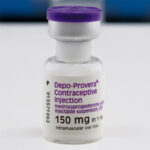Understanding Depo-Provera and Its Link to Meningiomas: What You Need to Know About the Risks, Lawsuits, and Your Legal Rights
Depo-Provera, a widely used injectable contraceptive, has long been marketed as a convenient and effective “birth control shot”. However, recent scientific studies have uncovered a disturbing link between long-term use of this medication and the development of brain and spine tumors called meningiomas. These findings have prompted lawsuits and other legal action against its manufacturer, Pfizer, for failing to adequately warn users about this serious risk.
What Is Depo-Provera?

Depo-Provera (Generic: medroxyprogesterone acetate) is a form of hormonal contraception administered every three months by injection into the muscle. It functions by suppressing ovulation, thickening cervical mucus to block sperm, and altering the uterine lining to prevent pregnancy. Popular for its convenience and high efficacy rate (over 99% when used correctly), Depo-Provera has been prescribed to millions of women worldwide since its U.S. FDA approval in 1992.
A lower dose version of Depo-Provera, called Depo-SubQ Provera 104, which is injected under the skin instead of into the muscle, also contains the same ingredient that has been linked to meningiomas.
A Controversial History
Depo-Provera’s approval journey was marked by decades of regulatory scrutiny and controversy. Initially rejected by the FDA due to safety concerns, including potential links to cancer, the drug was eventually approved following additional studies and increasing global acceptance. Despite its wide use, concerns about its long-term safety persisted, particularly regarding bone density loss, cancer risks, and neurological conditions.
The Link Between Depo-Provera and Meningiomas
What Are Meningiomas?
Meningiomas are tumors that develop in the meninges, the protective membranes surrounding the brain and spinal cord. While most meningiomas are called “benign” (that is non-cancerous), they often cause serious complications due to their location where they can press upon the brain and spinal cord, including:
- Vision loss
- Seizures
- Cognitive decline
- Debilitating headaches
- Paralysis or other neurological impairments
Because of these complications, meningiomas often require risky surgery on the brain or spinal cord that can itself lead to ongoing serious health problems.
Meningiomas are classified into three grades:
- Grade I: Slow-growing and non-cancerous (most common).
- Grade II: Atypical tumors with a higher recurrence rate.
- Grade III: Malignant, aggressive, and rare.
Scientific Evidence of the Connection
A March 2024 study published in the British Medical Journal (BMJ) revealed a significant association between long-term Depo-Provera use and meningioma development. Key findings include:
- Women using Depo-Provera for over a year had a 5.5 times higher risk of developing meningiomas compared to non-users.
- The tumors are thought to arise due to the synthetic hormone progestin, which may promote tumor growth in cells with high progesterone receptor density.
Historical Research Supports the Link
As early as 1983, studies suggested that meningiomas contain high levels of progesterone receptors, indicating that hormone-based drugs like Depo-Provera could influence tumor growth. Subsequent research reinforced these findings, highlighting the biological mechanisms by which synthetic progesterone could exacerbate tumor development.
Diagnosed with a Meningioma After Taking Depo-Provera?
Legal Implications and Lawsuits Against Pfizer
The Basis for Legal Action Against Pfizer
Pfizer, the manufacturer of Depo-Provera, is facing lawsuits alleging:
- Failure to Warn: Pfizer failed to update its warning labels to reflect the risk of meningiomas, despite decades of scientific evidence.
- Negligence: The company prioritized profit over patient safety by not disclosing known risks, potentially endangering millions of users.
Eligibility to File a Lawsuit
To file a Depo-Provera lawsuit, individuals must typically meet the following criteria:
1. Used any of the following for at least two injections:
- Depo-Provera
- Depo-SubQ Provera 104 (This may have been in the form of an at-home injector pen)
- A generic version of Depo-Provera (Also known as: medroxyprogesterone acetate)
2. Diagnosed with a meningioma or other brain/spine tumor.
Some Generic Brands of Depo-Provera May Also Be Eligible
Federal law requires generic manufacturers to use the same warning labels as the brand name drug approved by the FDA. Because of this, typically generic manufacturers cannot be held liable for failure-to-warn claims or design defect claims. However, because many Depo-Provera generics were produced by companies that had some connection to Pfizer, people harmed by using these generic products may still have a claim. Our legal team has the experience to help make that assessment and work to get the best settlement for you.
Generic Depo-Provera manufactures we are investigating include:
- Greenstone
- Viatris
- Prasco Laboratories
Statute of Limitations
The “Statute of Limitations” is the time frame the law allows to file a lawsuit. This time frame varies by state and sometimes by the circumstances surrounding an individual case. It’s crucial to consult legal experts promptly to ensure compliance with these deadlines.
Potential Compensation
Victims may be entitled to compensation for:
- Medical expenses (e.g., surgeries, radiation therapy, rehabilitation)
- Lost income due to inability to work
- Pain and suffering
- Emotional distress
Why Pfizer May Be Held Liable
Drug manufacturers are legally obligated to conduct rigorous safety testing and provide clear warnings about potential risks. In the case of Depo-Provera:
- Pfizer inherited decades of safety concerns from its predecessor companies but failed to act on them.
- Meningiomas were known to have receptors to progesterone, the active ingredient in Depo-Provera, nine years prior to its approval.
- The omission of meningioma risks from warning labels suggests negligence or willful disregard for consumer safety.

Impact of Failure to Update Warnings
Had Pfizer disclosed these risks, many women might have chosen alternative contraceptive methods. Transparency would have enabled both patients and healthcare providers to make informed decisions, potentially avoiding serious harm to many women.
Medical and Emotional Toll on Victims
Symptoms and Diagnosis
Many Depo-Provera users with meningiomas report debilitating symptoms, including:
- Persistent severe headaches
- Vision loss or disturbances
- Hearing loss
- Problems with speaking
- Balance issues
- Cognitive decline and memory loss
- Seizures

Diagnosis often involves advanced imaging techniques like MRI scans, with treatment ranging from observation to invasive surgeries, such as craniotomies (where a part of the skull is removed to allow access to the tumor on the surface of the brain).
Post-Treatment Challenges
Even after tumor removal, patients may face:
- Long-term neurological problems
- Complications (including risk of death) from surgery
- Emotional trauma
- Increased risk of tumor recurrence
These challenges underscore the need for accountability and adequate compensation for affected individuals.
Steps to Take If You’ve Been Affected
- Seek Medical Evaluation: If you’ve used Depo-Provera and are experiencing symptoms, consult a healthcare professional immediately.
- Document Your Case: Gather medical records, prescription history, and other relevant documents.
- Consult Legal Experts: Reach out to attorneys experienced in complex litigation, like our team at Pritzker Hageman.
Why Choose Pritzker Hageman Attorneys for Your Depo-Provera Lawsuit?
Pritzker Hageman is a nationally recognized law firm with a proven track record in holding big companies accountable for the harm they have caused. Our team of attorneys:
- Have extensive experience in product liability and defective product cases.
- Provide personalized attention to every client.
- Operate on a contingency fee basis—you never pay anything at all unless we win your case.
- We serve clients in all 50 states to pursue maximum compensation and justice for Depo-Provera victims.
Our Depo-Provera legal team is led by attorneys Alicia Penner and Morgan Vanden Heuvel and supported by our deep bench of complex litigation attorneys, experts, and paralegals.

Attorney Alicia Penner
Alicia Penner advocates tirelessly for women harmed by Depo-Provera and other defective pharmaceuticals and devices. Alicia has extensive experience and success pursuing compensation on behalf of our clients injured by medical products produced by some of the biggest companies in the world. She handles cases that involve the most highly complex areas of law and medicine.

Attorney Morgan Vanden Heuvel
When the negligence of big medical companies leads to serious injury Morgan Vanden Heuvel works tirelessly to get our clients the compensation and justice they deserve. When a defective product has led to the death of a loved one, Morgan pursues justice for them and their family and makes sure the wrongdoers are held accountable. Legal actions she has worked on include huge cases involving thousands of people injured by medical devices and product contamination.
Contact Our Depo-Provera Legal Team Today
The link between Depo-Provera and meningiomas is a stark reminder of the importance of transparency in healthcare. If you or a loved one has been affected, know that you’re not alone. Legal help is available. Alicia, Morgan and all the attorneys at Pritzker Hageman are here for you.
Don’t wait—take the first step toward justice for you and your family today by contacting our team for a free consultation. We will fight for you to hold Pfizer accountable and secure the compensation you deserve.
Our lawyers have won millions of dollars for people injured by defective medical products – Contact us.
Phone: 1-888-377-8900 | Text: 612-261-0856
The consultation is free and you never pay anything until we win for you.
Attorneys on our Depo-Provera legal team have been recognized in:
U.S. News & World Report

Pritzker Hageman has been recognized as one of the best law firms for personal injury litigation by U.S. News & World Report every year the award has been given since 2012.
Super Lawyers®, Thomson Reuters

Attorneys at Pritzker Hageman have been awarded the peer selected Super Lawyers distinction every year since 2004.
America’s Top 100 Attorneys®

Lifetime Achievement selection to America’s Top 100 Attorneys®.
Three Time Attorneys of the Year

Pritzker Hageman lawyers have been named Attorneys Of The Year by Minnesota Lawyer three times.